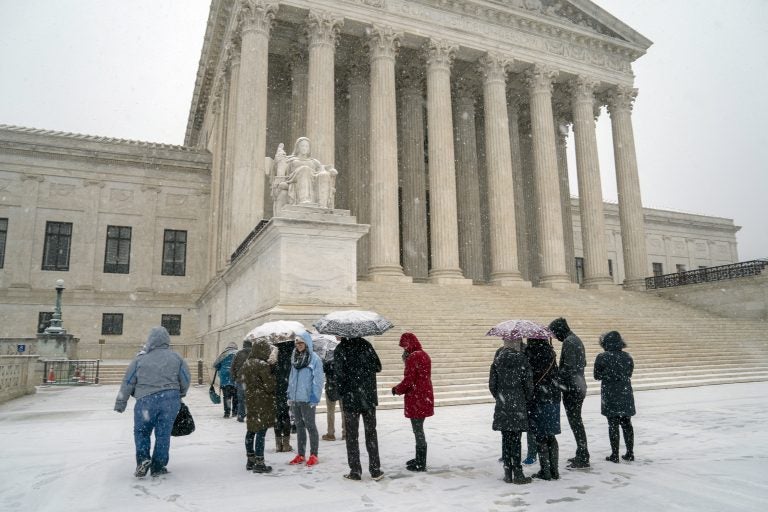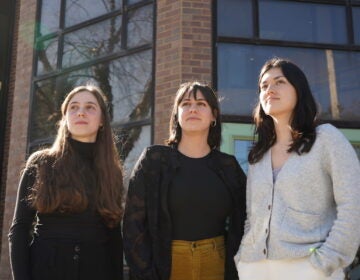The end of civil asset forfeiture? U.S. Supreme Court ruling has advocates hopeful
The U.S. Supreme Court placed limits on the civil asset forfeiture, but Pennsylvania’s high court already reined in the program throughout the state.

Visitors wait to enter the Supreme Court as a winter snow storm hits the nation's capital making roads perilous and closing most Federal offices and all major public school districts, on Capitol Hill in Washington, Wednesday, Feb. 20, 2019. The Supreme Court is ruling unanimously that the Constitution's ban on excessive fines applies to the states. (J. Scott Applewhite/AP Photo)
The U.S. Supreme Court on Wednesday placed limits on the ability of local law enforcement to seize homes, cars and cash from people suspected of being involved in crime.
Writing for all nine justices in a unanimous decision, Ruth Bader Ginsburg said the Eighth Amendment’s ban on excessive fines applies to state and local government and should limit the ability of law enforcement to seize assets that are grossly disproportionate to the gravity of the suspected crime. The case centered around an Indiana man suspected of selling $400 worth of heroin whose $42,000 Land Rover was taken by authorities.
“The protection against excessive fines has been a constant shield throughout Anglo-American history: Exorbitant tolls undermine other constitutional liberties,” Ginsburg wrote.
The ruling is not expected to have a direct impact on Pennsylvania, where the state’s high court delivered a decision in recent years that went beyond Wednesday’s news.
Pennsylvania law has long allowed authorities to use civil asset forfeiture programs that operate based only on the suspicion of criminal activity. Often these cases involve suspected drug traffickers and aim to deprive them of their working capital and profits.
In May 2017, the Pennsylvania high court ruled that in order seize someone’s property through a civil forfeiture proceeding, the person whose property is being taken must have “actual knowledge” of the alleged illegal activity and the person must have agreed to allow the activity to happen.
With this bar raised, it is possible that it has impacted how often police use civil asset forfeiture, but the full effect of the 2017 decision remains unclear.
According to the most recent statewide data, Pennsylvania authorities are still generating tens of millions of dollars for law enforcement agencies across the state annually by selling the seized assets.
“And that presents a direct conflict of interest. When police and prosecutors have a direct financial stake in the property they seize or the outcome of forfeiture proceeds, there can never be an impartial administration of justice,” said Darpana Sheth, a lawyer with the Institute of Justice, a group opposed to civil asset forfeiture.
The organization tracks the use of civil asset forfeiture nationwide and grades states based on how closely the programs line up with the U.S. Constitution.
Pennsylvania, the group says, has some of the most abusive civil asset forfeiture laws in the country.
“Civil forfeiture is essentially an end-run around the criminal justice system,” Sheth said. “It subjects people to punishment, but doesn’t afford them the right to the attorney, the right to have to be proved guilty beyond a reasonable doubt. Civil forfeiture undermines all of those guarantees.”
For years, the organization has been locked in a legal challenge with the city of Philadelphia over civil asset forfeiture.
A proposed settlement agreement is now awaiting a federal judge’s approval that would pay out $3 million to those whose assets were taken by Philadelphia authorities in a manner that Sheth said deprived them of basic rights to due process and equal protection under the law.
City prosecutors in Philadelphia illegally seized $64 million worth of homes, cars and cash from people suspected of being tied to the drug trade over a ten-year period, according to Sheth’s filings as part of her group’s lawsuit.
Philadelphia District Attorney Larry Krasner is opposed to civil forfeiture and has promised not to use it, a position formed after local reporting revealed what critics said was rampant abuse of the program by his predecessors on the backs of people who had little ability to contest the seizures.
A WHYY investigation found that the proceeds of the seized assets flowed into an unregulated budget that was used to buy wish list items such as submachine guns and custom uniform embroidery.
Sheth hopes Wednesday’s decision leads the U.S. Supreme Court to take a case that could completely ban the practice.
“We hope that this is just the first in a series of cases that the U.S. Supreme Court will take up to examine the constitutional limits of civil forfeiture,” she said.
WHYY is your source for fact-based, in-depth journalism and information. As a nonprofit organization, we rely on financial support from readers like you. Please give today.





